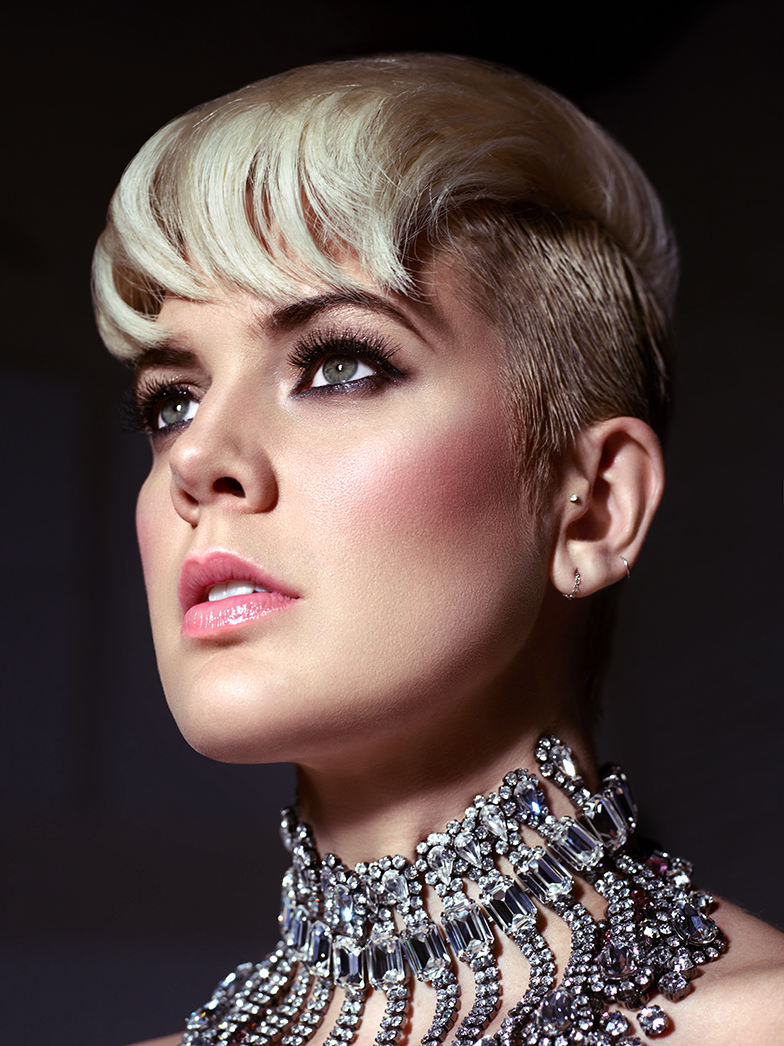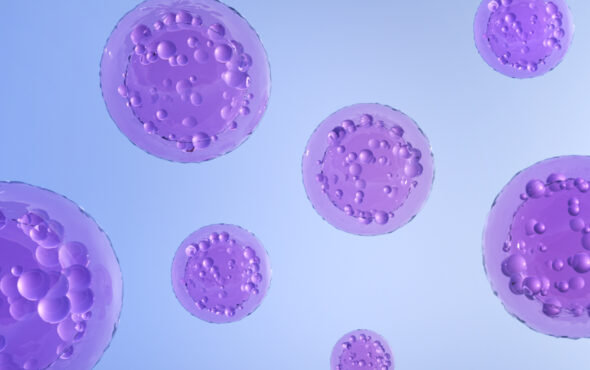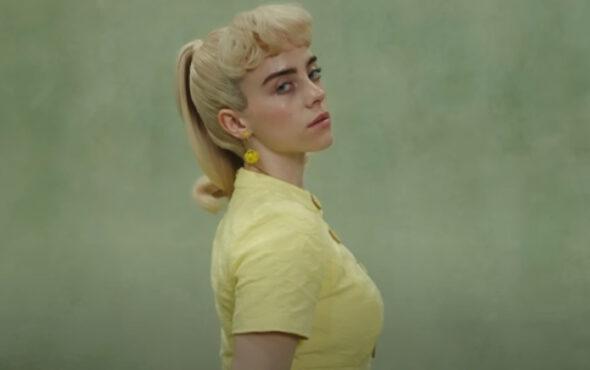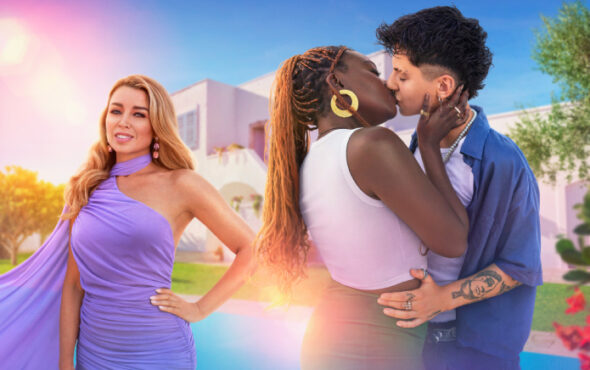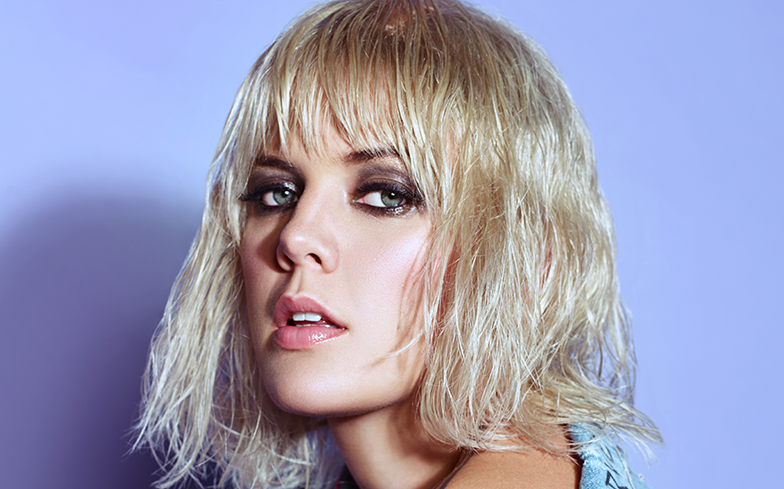
“My whole life is very queer,” Betty Who says. “It’s very much being a part of the LGBTQ community.”
We’re chatting over the phone a day after she started her support slot for Panic! At The Disco as they embark on huge tour of North America. Naturally, she’s full of praise for frontman Brendon Urie, but also excited to be back on the road previewing new material from her forthcoming third studio album Betty.
It’s the first full-length studio album she will release following her departure from major label RCA in 2017. Going independent has allowed the Sydney-born star to embrace her love for pop, fulfilling childhood dreams to their fullest extent. You only have to listen to new cut The One to hear that turn-of-the-millennium pop has been a firm fixture in her record collection for two decades.
But going indie also relies heavily on your legion of fans sticking with you. Betty has been a vocal and visible advocate for the queer community throughout her career, so there was no way her LGBTQ fanbase would not come out for her now. Here we discuss the power of having that passionate following, her big ambition of becoming a one-woman boyband, and why filming a music video with the Queer Eye guys turned out to be “the gayest day” of her life.
Before we go any further, we need to speak about the incredible homage to 90s pop music that is your new song The One.
That song is one of my favourites on the record. I have been wanting to do a song like for, I couldn’t tell you how long. I listened to a lot of *NSYNC during the making of this album because I fucking love them. They were one of my favourite bands during my childhood. I felt like I needed to have a song that made me feel like I was in a boyband. I remember growing up and being sad that I wasn’t a boy because that meant I couldn’t be in a boyband. When I was young I really felt it was my calling in life. I was worried I was going to try and fail at making a song that was an appropriate homage to them. When I was first played the production of the song, I literally had a tear in my eye. It was so exciting.
In terms of recapturing that whole era, it really delivers.
It does exactly what I wanted it to do. I wanted to be in pop music because of those artists. It was the start of my love for pop. I respect it so much. It’s about giving something to the 10-year-old me.
What you’ve got to promise us now though is that you will go full drag king for the music video and play every member of your own boyband.
You have no idea! Just wait.
I want to see all white baggy combats and tank top combos.
Oh just you wait, babe. It’s going to be fucking lit!
Speaking of music videos, we the visual for your last single Between You & Me and the queer narrative that played throughout. What made you decide to play both sides of a same-sex love story?
On all of the music videos for this album I’m playing opposite myself in some way. When we were talking about this video, I went straight to the director and I said, ‘I don’t always want to be playing a boy and a girl version of myself – I want to try different stories.’ Especially if I’m going to be the one being each character. So here, not only am I portraying a queer love story, I’m telling stories to open people’s hearts and minds, and see into a world for a second and go, ‘Oh it’s not about anything except love and friendship.’ Exposure is the name of the game, and our generation are exposing people to different stories. The internet has done that right? It means a person from some small town in Arkansas who never had the internet in the 80s and has never met a gay person, now has the internet which is full of gays to show them the way and be like, ‘We’re people too.’ I really want to do a lot of that in my career. I want to tell different stories that represent us as a community and expose people to those communities. I want us to get to the day where they go, ‘Oh it’s not a queer love story, it’s just a love story.’ Through my community of fans, I can’t tell you how much more involved in the LGBTQ community I’ve become, and how much more at home I feel in that community. So it’s also telling my truth through that as well.
I was going to touch upon you having been a continuous advocate for the LGBTQ community. What do you think the most important thing an ally with a platform can do?
I think no matter what you’re always going to upset somebody with what you say and what you do. But with that in mind, I think the best thing that any person that’s in the public eye can do is speak their truth and be authentic. For any ally who is speaking out for what they believe, it should never just be about ‘I’ve got a platform and I’ve got to use it.’ It’s got to be about you. My whole life is very queer. It’s very much being a part of the LGBTQ community. I get to play shows for so many people who are a part of the LGBTQ community, so it feels like an extension of my life. It’s never felt like they are other people who come into my shows and I’m, ‘Oh you’re just my fans.’ I’ve just always had a very gay life. I never really feel like I have to work to be an ally because it’s just how I’ve been my whole life.
Back to your new album Betty: it really plays out like a celebration of pop in all its forms. Was that your intention going in?
Sort of. A lot of my fans keep reminding me just how much they love my first record. It’s never in a shady way towards The Valley, it’s more like ‘I love The Valley, but Take Me When You Go is my favourite.’ I’ve spent a lot of time thinking about that because I was just a girl in a basement when I was 19 and nobody was listening to my music – nobody cared. I wrote what I wanted to, and that happens to be my fans’ favourite songs. The Valley will always be something I’m very proud of because so much heartache and sadness was a part of making that record. The thing I look back on that record with is a lot of gratitude for how strong I was to make it out and now be on the other side. So going into this record I had all of that – all of this appreciation for the first record, the second record was a nightmare to make, and I’m standing here with all of this growth and adulthood staring me in the face, and I’m making this album and all I want to do is create songs that make me happy. It’s not about having to please anybody else, because I don’t have to send songs to a record label, I don’t have to think about ‘what if my fans don’t like it’ – that stresses me out more. So I really tried to go inward and go, ‘what do I really want to do?’ That’s how The One came about, because I’ve always wanted to make a boyband song, but I was always afraid that RCA would be like, ‘No.’ So I made my boyband song. All This Woman is so sexy and grown up, and I never would have felt like I could pull that off five years ago. There are so many moments on the record that are songs that I’ve always wanted to make but I’ve never felt confident enough to. It wasn’t even that I found my confidence, it was more that I found my ability to stop overthinking stuff.
How did you find the transition from major label to independent artist? Were you excited or nervous?
I was so grateful to RCA for 1) what they’ve done for me, and 2) for letting me go. It was a very nice thing for them to do. They could have sat me on a shelf and said, ‘No, we don’t want to let you go because what if we do and you go and do something better.’ Record labels do that literally all the time. But they were like, ‘Cool, you go do your thing, no worries.’ That kind of set me off on a really good leg. I left feeling really excited for the next step. It also made me realise that when you’re in the middle of a really difficult traumatic experience, I don’t think you can acknowledge how difficult it really is for you because if you do, you’ll never get through it. For so long I think I had my head in the sand a little bit and was just waiting to wake up and have it be OK, and I think that shows in every other part of my life and the records that I made. I can hear myself self-preserving because I had to. The stakes also went down for me a little bit, which was really necessary. When you’re making music and everybody there – a hundred people on an email – are going, ‘Well, if this isn’t the biggest song in the world then you fucked up.’ Never in those words, but that was always the feeling you had. If I don’t have a No.1 song, I disappoint everybody. That’s not why I make music. I make music so I can play shows for the people who want to come to them. I’m lucky enough to already have people who are coming to my shows.
And it’s during these moments you really rely on the audience sticking with you, which I imagine has made you realise just how incredibly loyal an LGBTQ fan base can be?
I can’t even tell you. I know it sounds goofy, but I have no words for how grateful I am for the people who have shown up for me. Like, consistently. I literally think all of the time – I’m getting emotional – I think all of the time, ‘I don’t really understand what I did to warrant so much support.’ I could name you 25 people who are good friends of mine, who want to do the exact same thing as I do, and are probably more talented than I am, who don’t have that. I get to go on stage every night now in front of people who sing the words back to me. It has been my dream my whole life. It’s why I was always like, ‘I don’t care I don’t have a No.1 song. I have what I’ve always wanted. I’m living it.’ So to be made to feel like I’m not… I just want to be grateful and psyched for what I have now, and give my all to that, instead of chasing something that I don’t really need. There’s literally nothing more I can do than give back in trying to make good music that makes everyone happy.
One of the nice little surprises we had from you last year was your theme tune for Queer Eye. How was it filming the music video with the Fab Five?
It was so fucking fun. I’m obsessed with all of them. It was such a cool cultural moment to be a part of. I kind of didn’t realise the extent of it. I thought it was just a promo thing, and didn’t realise I’d be actually making a music video with them. I’d just said ‘Yes’ because I absolutely loved it. I thought it was going to be this little online only thing, and then it turned into this music video with all the boys involved. It was such a fun day on set. I walked in and Karamo was sitting in a glitter jacket with all of these glitter boxes of tissues and a Beyoncé fan on him in slow-mo just pretending to cry, and I was like, ‘This is the gayest day of my life!’
Queer Eye was such a huge moment last year. Why do you think it resonated so much with audiences all over?
Because they’re vulnerable, loving, and it’s such a great piece of LGBTQ culture to capture at this time. The old Queer Eye show was, I think, ‘cable TV gay’. In a way that Will and Grace humanised gay culture way before anybody had done that, the original Queer Eye was bringing gay culture to the forefront of people’s thinking but it wasn’t making it, y’know, ‘Oh by the way your next door neighbour could be gay and he’s nice and you love him and it’s fine.’ It was more like this really fun, New York City gay thing. So for Queer Eye to come back and be in the South, and see five completely different, individual gay men who all have their own experience and their own stories to tell, and to have them all being vulnerable and having conversations and educating instead of judging, and going, ‘Well actually that’s not true about gay culture because…’ I think that is so powerful and that changes so many people’s minds – and it has opened so many people’s minds.
Betty Who’s self-titled third studio album is now available on iTunes and streaming services. Read our review here.
